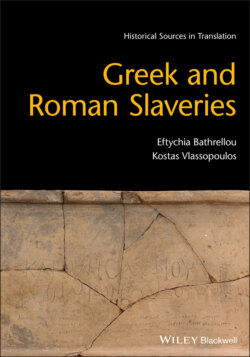Читать книгу Greek and Roman Slaveries - Eftychia Bathrellou - Страница 18
1.7 Plutarch, Spartan Sayings 239d–e: Greek Collection of Sayings (Late First/Early Second Century CE)
ОглавлениеLiterature: Hodkinson 2008; Luraghi 2009.
Lycurgus15 was thought to have secured for the citizens a fine and blessed good: abundance of leisure. For it was absolutely forbidden to touch manual work; moreover, there was no need at all of money-making, which involves painstaking accumulation, or of business activity, because Lycurgus had rendered wealth wholly unenviable and dishonorable. The helots worked the land for the Spartans, paying to them a part of the produce (apophora), which was regularly set in advance. A curse was in place against anyone who rented out the land for more, so that the helots might serve gladly since they were making some gain, and the Spartans themselves might not try to get more.
In which way did the Spartans benefit from the agricultural work of their helots? How did it differ from other forms of employing slaves in agriculture? Cf. 4.2–6.
How does Plutarch explain the reason for this arrangement?
Do you accept Plutarch’s explanation? What other explanations can you think for this arrangement?
Does this arrangement make helots completely different from chattel slaves? Cf. 12.18–9.
